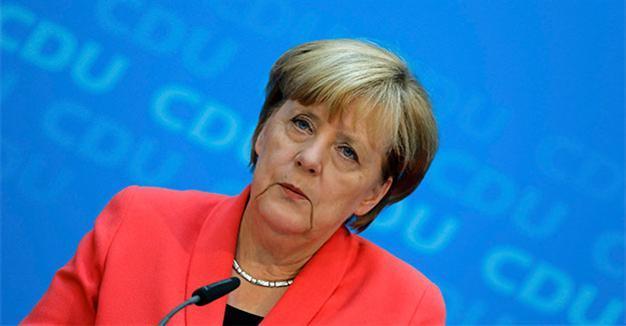Merkel party routed in Berlin polls as right-wing AfD makes gains
BERLIN

German Chancellor and chairwomen of the Christian Democratic Union (CDU) Angela Merkel addresses a news conference in Berlin, Germany, September 19, 2016. REUTERS photo
German Chancellor Angela Merkel’s Christian Democratic Union (CDU) party suffered its second electoral blow in two weeks on Sept. 18, slumping to its lowest level since 1990 in a Berlin state vote that rejected her open-door refugee policy.
A three-way coalition of the Social Democratic Party (SPD), the Green Party and the Left Party seems likely in Berlin, after Merkel’s conservative party endured a set-back in state elections in the German capital, official results showed Sept. 19.
While the SPD and CDU emerged from the Berlin election as the two strongest parties, both lost support to parties further to the left and right, meaning they will not be able to continue a coalition government.
The SPD received 21.6 percent, dropping 6.7 points, while the CDU received 17.6 percent, down 5.7 points.
The anti-capitalist Left Party, a descendant of the former East German communists, gained 3.9 points to 15.6 percent; the Green Party received 15.2 percent, down by 2.4 percentage points.
The nationalist anti-immigrant Alternative for Germany, known as AfD, easily entered its 10th state parliament with 14.2 percent of the vote.
The election also saw the Pirate Party voted out of state parliament, and the pro-business Free Democratic Party winning 6.7 percent of the vote - enough to bring it back into parliament.
Voter participation rose to 66.9 percent from 60.2 percent in the last election, and the three-year-old AfD drew a lot of its support from new voters, though it was also able to attract supporters from the SPD, the CDU and other parties.
A year before a national election, the result is set to raise pressure on Merkel and deepen rifts in her conservative camp, with more sniping expected from her CSU allies in Bavaria.
Merkel’s Christian Democrats were routed in the eastern state of Mecklenburg-Vorpommern two weeks ago, triggering calls from the CSU for her to toughen up her migrant policy.
The AfD, founded in 2013 as an anti-euro party, was the big winner. It has in the last year played to voters’ fears about the integration of the roughly one million migrants who entered Germany last year.
“From zero to double digits, that’s unique for Berlin. The grand coalition has been voted out - not yet at the national level, but that will happen next year,” said AfD candidate Georg Pazderski to cheering supporters after the results.
